“We have to do it right, from the start"
Washington State—The Washington State Building Code Council (SBCC) is currently considering the adoption of a stronger energy code that includes proposals to require high-efficiency electric space and water heating in new commercial and large multifamily (over four stories) buildings.
SBCC held an initial public meeting on February 25, 2022 hearing testimony that demonstrated the broad and diverse support across the state for these code proposals. Strong favor for the proposed code changes was clear with over 60 testifying in support during the lengthy meeting. The SBCC updates and improves building and energy codes only once every three years, making 2022 a unique opportunity to adopt the most climate-friendly statewide building energy code in the country. Building electrification is on the rise nationally, and local jurisdictions in Washington have already taken action this year to accelerate the transition towards clean electrification and away from gas use for space and water heating building; local communities recently moving forward including Seattle, Shoreline, Bellingham, Tacoma, and Olympia.
Top testimony highlights included several state legislators and elected leaders, including Rep. David Hackney (11th LD), Sen. Liz Lovelett (40th LD), Sen. Mona Das (47th LD), Rep. Davina Duerr (1st LD), Ty Stober (Mayor Pro Tem of Vancouver), Jeni Woock (Gig Harbor City Councilmember) and Lisa Parshley (Olympia City Councilmember).
Sen. Lovelett encouraged the passage of code updates, saying “it's the right thing to do and the strategic thing to do, especially because we have so many people innovating in [the building electrification] space… our codes should reflect the direction we want to head.”
Ty Stober, Mayor Pro Tem of Vancouver, referenced a desire for state leadership in light of his city’s efforts to enact a climate action plan this summer that will include provisions for cleaner buildings. According to Stober, “it is better for the state to adopt clear codes than one-by-one piecemeal adoption across the state.”
State officials see adoption of the proposed code changes as essential if Washington is to meet its GHG emission reduction targets. Luke Howard with the Department of Commerce commented, “The code puts the state on the path to meeting our GHG emission limits. These proposals align with the State Energy Strategy, align our codes with the Clean Energy Transformation Act, and simply align carbon emission factors in the code with state law.”
Health experts weighed in, including doctors, health professionals, and hospital representatives from around the state, as did advocates for those most impacted by air pollution and its associated healthcare costs.
Ali Lee, a health, equity, and community organizer brought visibility to community safety impacts, saying “we need to remember that gas leaks out of the pipes, gas ranges and other utilities whether they are lit, on or off…in the United States a gas leak or fire happens [once] every four days...Code adoptions [in Washington], heat pumps, electrification will help level the playing field for communities and truly ensure equity for those who are the highest impacted as well as create jobs.”
Notably the largest healthcare provider in Washington, Providence Health, testified in support. Facility and Technology Services Director Geoffrey Glass said “we believe health is a human right; we cannot be healthy people without a healthy environment in which to live. We have committed to becoming carbon negative by 2030, supporting our vision for health for a better world. This code amendment can help us achieve our goal.”
Experts in residential building, including low income housing advocates, architects and builders voiced their support for updating the residential building codes for energy savings, job creation, and affordability.
Patience Malaba, with the Housing Development Consortium of Seattle-King County, highlighted how climate, housing equity, and health go hand-in-hand: “We don’t believe that our climate goals are in conflict with our housing goals…while [the] increase in demand for housing can be a justifiable reason not to alter the energy code, we argue that it is precisely because [of] this need…we should…mitigate the near and long term impacts of climate change. We need equitable distribution of clean energy benefits and [to reduce] the burden of impacts of climate change. We will create a state in which clean and resilient housing is accessible to those in need.”
Representatives from McKinstry, a large Seattle firm specializing in consulting, construction, energy and facility services, called attention to the readiness of heat pump technology and the need for standards to support market development. The company’s Zero Carbon Solutions Director Brad Liljequist testified: “Heat pumps are the number one strategy for decarbonization because they are so efficient. Heat pumps are ready for prime time…and need a push to become normative.” Senior Engineer Skander Spies added, “In my experience, nothing has had a more definite effect on energy use in buildings than thoughtful building codes. The time is now.”
Many also testified to share their personal experiences with climate impacts and the need for the Council to act to help the state accelerate the transition away from fuel sources that contribute to global warming and climate change.
Joelle Robinson, Field Director with Climate Solutions, provided a stark and emotional portrayal of her family’s experience during the recent intense flooding in Bellingham testifying, “[The flooding] is a terrible clarion call connecting the dots on extreme weather from climate disruption causing physical, emotional and economic suffering to families and communities. I hope you will enact these code updates to help reduce more of these events in the future.”
MORE ON THE STATE BUILDING CODE COUNCIL AND CODE UPDATE PROCESS:
The State Building Code Council is a 15 member state agency appointed by the governor’s office to develop statewide building codes. Council members represent various sectors and industries related to building and energy work, including construction, architecture, structural engineering, mechanical engineering, building trades, manufacturing and installation of building materials, and more, as well as seats for certain elected and government officials, and for at least one person with disabilities. At least six members must be from east of the Cascades.
The SBCC updates the commercial energy code, which also applies to large multifamily buildings (over four stories), every three years. Last year, the SBCC began the process of collecting code change proposals that were vetted by its Technical Advisory Group. Those proposals are now open for public input. The SBCC hosted this as the first public comment meeting with an overflow meeting scheduled for March 11, 2022, and will be accepting written public comment through March 11. The SBCC will vote on the proposed code updates at its April 22nd meeting.
Recording will be available on SBCC website: https://sbcc.wa.gov/meeting-schedules-agendas/council-standing-committe…
MORE BACKGROUND:
Building electrification efforts part of a national trend on climate
Buildings are one of the largest and fastest-growing sources of climate pollution in Washington, and contribute about one-quarter (23%) of Washington state’s carbon emissions, more than the industrial sector. The bulk of building emissions come from burning fossil fuels for space and water heating and cooking. Energy codes that direct the heating, cooling, and powering of buildings to be electric are increasingly being utilized as a central tool in cities and states across the country to reduce emissions, reduce maintenance and operational costs, prioritize public health and safety, and meet climate goals. Notably Washington’s 2021 State Energy Strategy found that electrifying buildings will be the lowest-cost pathway to economy-wide 95% carbon reductions by 2050.
Clean buildings policies align with public health and safety needs
Accelerating building electrification and prioritizing public health are also increasingly seen by doctors and public health officials to go hand-in-hand. Clean and safe buildings powered by electricity are better protected from outdoor and indoor air pollution, more resilient during major catastrophes like earthquakes, and can collectively lead to healthier communities. Particulate matter (PM2.5) pollution from commercial and residential buildings, primarily the result of gas appliances, is responsible for approximately 18,300 early deaths and $205 billion in health impacts per year nationwide. In Washington alone, outdoor emissions of nitrogen oxides (NOx) and volatile organic compounds (VOCs)—two of the pollutants associated with burning gas specifically—cost the state an estimated $278 million and $222 million in health impact costs respectively. Pollution from extracting and burning gas accelerates climate change—and it exacerbates asthma and other respiratory health risks, especially for children, the elderly, lower income, and Black, Indigenous and communities of color, who are already disproportionately bearing the burden of air pollutants.
###
ABOUT SHIFT ZERO
Shift Zero’s mission is to catalyze a just transition to zero carbon buildings for all in Washington State. We do this by advocating for policies and programs that maximize energy efficiency and eliminate emissions from buildings. As an alliance, we convene our members’ technical, policy, and advocacy expertise to identify solutions that can scale up to meet the urgency of the climate crisis. Collectively, we educate decisionmakers about how proven design approaches and building technologies can be leveraged to create affordable access to high-performance, resilient buildings. info@shiftzero.org



